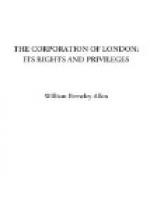The Norman Conquest naturally suspended for a time all these privileges, and reduced all free towns to the level of burghs in demesne. Desirous, however, to secure the good will of the citizens, William hastened to assure them of his protection, and to confirm their prescriptive rights and immunities. Thus ran the gracious expression of the royal pleasure:—“William the king greets William the bishop, and Godfrey the portreve, and all the burghers within London, French and English, friendly. And I make known to you that I will that ye be law-worthy, as ye were in the days of King Edward. And I will, that each child be his father’s heir after his father’s days. And I will not suffer that any man command you any wrong. God keep you.”
The import of this charter was to make the citizens “free tenants,” reserving to the king the seigniory, or proprietary title. The epithet “law-worthy” is equivalent to a declaration that they were freemen, for in the feudal ages none other were entitled to the forms of law; while the right of heirship apparently exempted them from the rule of primogeniture which prevailed among the Norman conquerors;—it is probable, however, that this exemption did not long hold good. In other respects the citizens of London continued to be governed by their own laws and usages, administered by their own magistrates after the ancient and established forms. A nucleus of liberty was thus preserved amidst the tyrannical usurpations of the Norman barons, and the bold burgesses many a time stoutly resisted the encroachments that were attempted to be made on their hereditary rights. At all periods of English history, indeed, have the citizens of London stepped forward as the champions of freedom, and shown themselves the incorruptible guardians of the public interests. Never at any time, however, was there greater necessity for a sturdy bulwark against the growing power of the oligarchy than at the present moment. Little by little—or, rather, by rapid strides—does the Government seek to get within its grasp the control of every department of the commonwealth. To-day, the East-India Company is abolished, for the sake of the “better government of India;” to-morrow, the Corporation is to be “reformed,” for the “better government” of the City; the day after, some other long-established institution will be swept away. There is nothing so repugnant to a ministry as whatever savours of self-government; for how. in that case can the “Dowbs” be provided for? So long as the citizens manage their own affairs, there is no patronage at the disposal of ministers to bestow on a faithful or a wavering partisan. Young “honourables” and other needy scions of the governing classes have little ambition to undertake civic duties, while they are only onerous and expensive. Let the wedge be first applied. Let “reform” worm its way into the constitution of the Corporation, and then by degrees the whole edifice may gradually




